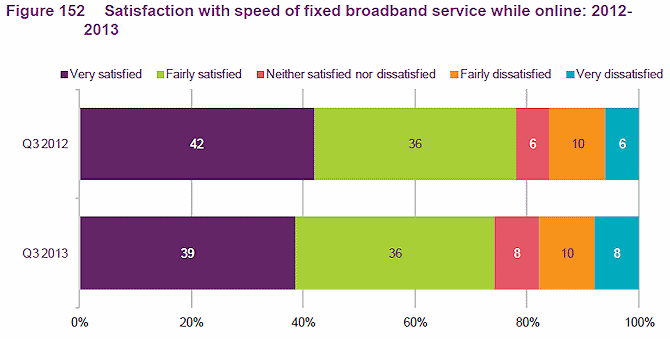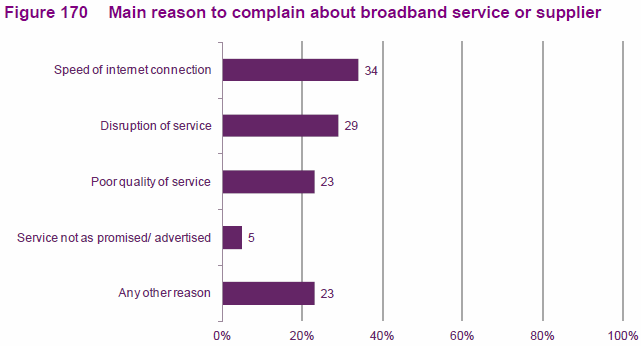Ofcom Find Decline in UK Satisfaction with Reliability of Broadband

The communications regulator has today published its annual Consumer Experience Report (2013), which among other things reveals that consumer satisfaction with broadband service reliability has fallen from 88% in 2012 to 83% in 2013 and this is highest for those who live in rural areas where poor connectivity is more common.
Satisfaction with fixed line broadband ISP speeds has also fallen, with customers living in rural areas being twice as dissatisfied with the speed of their service as those living in urban areas (32% vs. 16%). The movement seems curious given the growing spread of superfast broadband connectivity, although admittedly much of that effort has yet to benefit rural areas.
Advertisement

Meanwhile customer satisfaction with service reliability is highest for landline telephone (94%) and digital TV (93%) services, which have remained fairly unchanged over the past 12 months. Never the less 20% of consumers claimed to have switched at least one communications service in the past 12 months, although yearly switching levels were broadly unchanged at around 9% for fixed-line phones, 11% for mobile and 9% for fixed broadband (9%) services.
The majority of switchers (between 84% and 92%) considered it very or fairly easy to change provider, although the fixed broadband ISP market continues to have the highest levels of stated difficulty in switching (13%). Ofcom are currently working to simplify this process but that won’t be introduced for another year or so.
Ed Richards, Chief Executive of Ofcom, said:
“The quality and value of communications services matters as much as their availability. The record in the last decade is good but we are determined to maintain focus on these important areas to ensure that communications markets continue to work in the best interests of consumers.”
Cost is another key area of interest on the broadband landscape and it also remains one of the most common reasons why consumers swap provider (between 54% and 62% of switchers for fixed voice, broadband, mobile or TV markets pointed to this); poor service was also a big factor (29% for fixed broadband). At this point it’s interesting to note the main reasons why consumers complain about broadband.

On average, UK households were found to spend £113.61 per month on communications services in 2012, which is £1.55 (1.3%) less than in 2011 and £12.28 (9.8%) less than in 2007 (equivalent to 5.4% of total household spend in 2012). But the average revenue of residential broadband connections still increased by 1.2% to £16.38 per connection in 2012.
Advertisement
Ofcom claims that the average revenue boost for residential broadband is largely due to the rising take-up of superfast broadband (30Mbps+); related services often attract a premium of around +£10, although it notes that the premium attached to such services has declined by 8.2% in the past year (i.e. superfast is getting cheaper). In the year to May 2013 the proportion of UK residential fixed broadband connections that were deemed by Ofcom to be “superfast” also increased from 8% to 19%.
As usual the regulators full report is a 205 page beast and a lot of it involves data that we’ve already covered (e.g. the biannual broadband speeds report). Never the less if you want to have a read then the full piece can be found below.
Ofcom’s 2013 Consumer Experience Report
http://stakeholders.ofcom.org.uk/market-data-research/…consumer-experience/
Mark is a professional technology writer, IT consultant and computer engineer from Dorset (England), he also founded ISPreview in 1999 and enjoys analysing the latest telecoms and broadband developments. Find me on X (Twitter), Mastodon, Facebook, BlueSky, Threads.net and Linkedin.
« Akamai – Global Internet Download Speeds Average 3.6Mb as UK Top 9.1Mb





















































Comments are closed